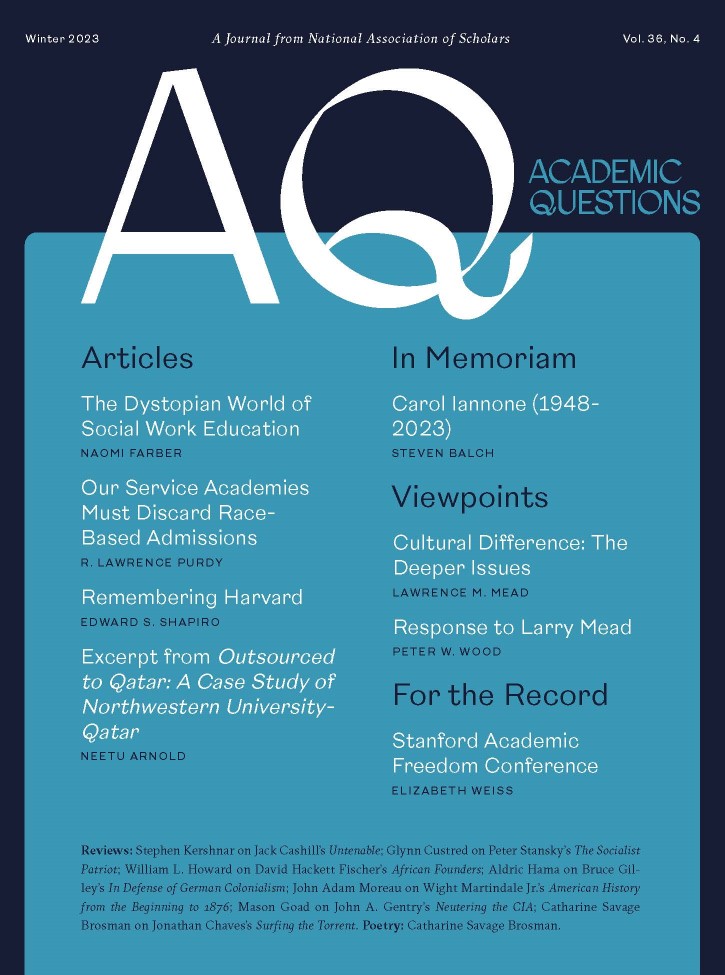For many years this space in the opening pages of Academic Questions was occupied by the elegant essays of Carol Iannone. Her sudden death in December grieves those of us who had the immense pleasure of working with her. In my case that was over seventeen years from the era in which we struggled against the design and editorial impositions of the entities that owned our journal, most recently Springer Verlag. We sat down with the emissaries of Springer on several memorable occasions and explained to their uncomprehending ears what our commitments to intellectual freedom and independent thought meant.
At last, fed up with our refusal to cancel some articles and avoid others, Springer granted us our freedom in July 2020. We could have abrogated our contract sooner but Springer held over our head its ownership of the journal title, its backfiles stretching to our first issue in 1987, and our access to the digital archive. Carol and I managed our manumission from Springer in a manner that gave us ownership of all this.
We also gained ownership of the design of the journal. Springer had shrunk the size of our pages and reduced the font to the point where the text was hard to read. Carol had a lot to say about how the journal should look and Chance Layton eventually came up with the new design that has graced the last several issues.
But Carol’s contributions to Academic Questions went far beyond the struggle to keep it independent and attractive. Her day-to-day work was to recruit scholars to write articles on topics we had decided to address, and to read, critique, and edit the articles we received, whether solicited or submitted over the transom. She approached these tasks with exemplary thoroughness. Every article that came into Academic Questions began the gauntlet with three independent assessments—Carol’s, Seth’s, and mine. If we agreed that the article had promise as an AQ publication, we had then to decide on whether and how it should be reshaped. Often this meant shortening the original. We academics love nuance and detail, perhaps a little more than our readers. We often judged that what the author found convenient to say in 5,000 words might be better said in 3,000.
Cutting, however, was only one part of the editorial artisanry. Carol’s greatest strengths were her ability to notice what was missing and where an author had skipped a step in his logical argument. She would have to explain this to authors who were not always happy to hear it or to go back to their work with a list of what Carol had deemed necessary additions.
The three of us who worked together to produce this quarterly had a close and warm working relationship, which meant we could disagree. Carol was frequently in favor of pressing the outward boundaries of our mission. Academic Questions deals primarily with disputes within the academy, though these frequently have bearing on broader public issues. Transgenderism, colonialism, climate change, and race, for example, are all issues that are the red-hot center of academic debate, but plainly are also matters that have a large resonance in public discussion beyond the academy. But there are many matters where the locus of debate is not academic, even if academics sometimes weigh in. If you have noticed articles in Academic Questions that seem to stretch our remit, the chances are good that you are reading the results of Carol’s advocacy.
In this issue, you will find a reprint of a poem by Ezra Pound (“Kung Walked”) about Confucius, followed by some other free verse effusions. I stoutly resisted including these in Academic Questions. Their bearing on Academic Questions is, at best, slight, and this hardly seemed like a good moment to dust-off the wisdom of America’s leading anti-Semitic poet. Add to that my distaste both for imagist poems and raids on the supposed sagacity of philosophers who are remote from our own traditions. But I trusted Carol’s judgment to the point of giving way to her insistence that this small collection of verses would fit.
Just don’t expect to see anything more in this line.
This issue presents what I would describe as follow-throughs on topics on which the NAS has been working for a long time. The opening essay by Naomi Farber on social work education picks up the theme of a report we published in 2007, The Scandal of Social Work Education, by the criminologist Barry Latzer. Back then we documented how the accreditor for schools of social work was institutionalizing their descent into radical ideology. We touched the topic again in 2019. Professor Farber brings the story up to date. I imagine some readers wondering, “Why bother?” Isn’t it clear that the advocacy-oriented fields in higher education have long since abandoned any interest in objective inquiry or fair-minded debate? But social work remains an important pursuit in our fractured republic and it would be wise to understand how it has gone so badly adrift.
Harvard has been the focus of intense scrutiny since October 8, when thirty-four student groups demonstrated in support of the massacre of Israelis by Hamas terrorists the day before. Claudine Gay, Harvard’s president, could find no words of disapproval for the college’s terrorist sympathizers and no words of support for the college’s Jewish students and faculty members. After some very stiff criticism from Harvard’s former president, Larry Summers, President Gay issued a series of statements in which she tried to triangulate between her sympathies for the pro-Hamas faction and her reassurances to the Jewish community. Her highwire performance satisfied few, if any. The pro-Hamas faction would settle for nothing less than outright condemnation of the Jewish state founded on “settler colonialism” and the Jewish community expected unequivocal denunciation of and protection from the genocidal threats.
Readers know how this all ended—with Gay’s embarrassing performance on December 5 before the House Committee on Education and the Workforce, and the subsequent revelations that her meagre record of published scholarship is honeycombed with plagiarism. On January 2, Gay resigned as president but kept her tenured position in the Political Science Department and her $900,000 a year salary. The matter of her career-long academic dishonesty has so far been brushed aside.
This seems a perfect moment for Harvard alumnus Edward Shapiro to recall what standards Harvard once had. His essay, “Remembering Harvard,” is actually one of several we received from Harvard alumni, but it can stand for the testimony of the others. Once upon a time, Harvard had standards that pertained to its leaders as well as its students.
Larry Purdy writes in response to a loophole that the Supreme Court left in its decision ending racial preferences in higher education. Chief Justice Roberts left a footnote allowing that the ban on racial preferences did not apply to the military service academies. Purdy argues that this is an error that must be corrected.
NAS fellow Neetu Arnold blows the whistle on how Northwestern University decided to play doormat for the Qatari regime that is funding its school of journalism among other things. Arnold has been tracking the effort of America’s adversaries and frenemies as they buy their way into American colleges and universities. In several cases she has broken what have turned out to be major national stories.
This issue also includes an essay by Larry Mead on the cultural differences between Americans depending on their descent from European or non-European ancestors. His essay is followed by my rejoinder questioning whether Mead’s concept of “culture” can stand careful inspection.
We include in this issue Elizabeth Weiss’s detailed account of the Stanford Academic Freedom Conference in 2022, which aired many of the controversies still before us. What does the doctrine of academic freedom really mean when people such as Gay cite it to justify censorship? As we learn more and more about the coverups and official disinformation perpetrated by the architects of the Covid emergency, we also learn that those who were conscientiously speaking the truth were routinely—and forcefully—punished by the very people who presented themselves as the stalwarts of academic freedom.
Has anything changed? Not yet.
Peter Wood is president of the National Association of Scholars and editor-in-chief of Academic Questions.
Photo by Diego Jimenez on Unsplash












